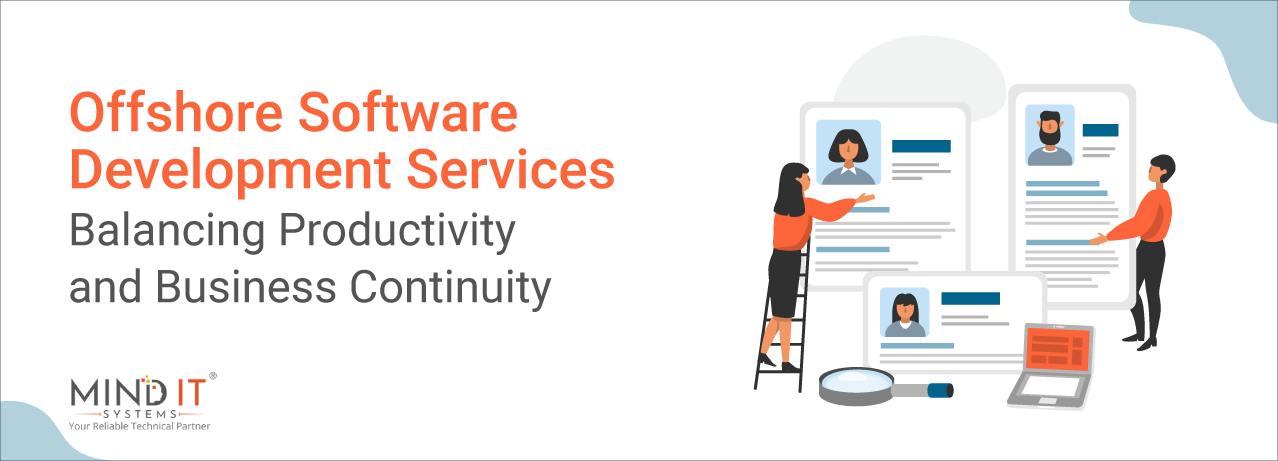
Offshore Software Development Services: Balancing Productivity and Business Continuity
Introduction
In today’s increasingly competitive market, businesses are constantly searching for options that can help them maintain a balance between productivity and business continuity. Here, choosing offshore software development services can be a decisive option.
This article highlights the advantages of offshore software development services, shedding light on how they allow businesses to bridge the gaps between productivity and business continuity.
So, let’s dive in straightaway!
The Advantages of Offshore Software Development Services
Beyond simply being cost-effective, offshore software development services provide a range of advantages that significantly contribute to overall development success. Below are the key benefits organizations can derive from offshore software development services.
Cost Efficiency:
- Offshore development benefits businesses by lowering labour and operational costs in the chosen outsourcing destination.
Global Talent Access:
- Tap into a diverse and global talent pool, gaining access to specialized skills and expertise that may be scarce locally.
Accelerated Timelines:
- Leverage time zone differences to maintain a continuous development cycle, resulting in faster project completion.
Scalability and Flexibility:
- Scale the development team up or down based on project requirements, providing flexibility and cost-effectiveness.
Increased Productivity:
- Operate on a 24/7 basis with teams working across different time zones, ensuring continuous progress and increased overall productivity.
Focus on Core Competencies:
- Outsourcing development tasks allows in-house teams to concentrate on core business functions and strategic initiatives.
Access to Advanced Technologies:
- Stay at the forefront of technology by leveraging the offshore team’s expertise in the latest tools and solutions.
Risk Mitigation:
- Diversify operational risks by distributing activities across different geographic locations, enhancing overall risk management.
Cultural Diversity and Innovation:
- Encourage innovation through cultural diversity, fostering creative problem-solving and unique perspectives.
Regulatory Compliance:
- Ensure compliance with industry regulations and standards, navigating legal complexities with the assistance of offshore experts.
In a way, the offshore software development model brings a lot to the table for business enterprises. It offers benefits like access to a large talent pool, innovation, expertise, and a cost-effective development cycle. Amidst all, the most significant advantage it offers to businesses is – to bridge the gaps between productivity and business continuity.
How to Bridge Gaps between Productivity and Business Continuity: Strategies to Achieve
Offshore software development services can be a reliable solution for businesses seeking to bridge the gap between productivity and business continuity in today’s competitive landscape.
Let’s explore how this can be achieved:
Establishing Dedicated Offshore Development Centers (ODCs):
Creating dedicated offshore development centers (ODCs) is crucial for companies looking to expand their development capabilities. ODCs provide a focused and collaborative environment for development teams and serve as an extension of the client’s workspace, promoting seamless communication and cooperation.
Emphasizing Effective Communication Channels:
Implementing robust communication channels is fundamental to bridging productivity and business continuity gaps. Companies can utilize advanced collaboration tools, regular video conferencing, and project management platforms to enhance communication and transparency. These tools help ensure that all team members are on the same page, no matter where they are.
Leveraging Agile Methodologies:
Adopting Agile methodologies is essential for businesses looking to improve their development processes. Agile enables teams to quickly respond to changing project requirements and enhance productivity without compromising quality through adaptive planning and continuous improvement. Implementing Agile practices can help companies achieve their development goals more efficiently.
Implementing Global Competence Centers (GCCs):
Setting up Global Competence Centers (GCCs) effectively streamlines operations and enhances collaboration between onshore and offshore teams. GCCs centralize key functions, optimize resource allocation, and ensure a synchronized approach to project management. This approach helps organizations to manage their development projects more effectively and efficiently.
Implementing Robust Project Management Practices:
Companies must apply effective project management practices in today’s competitive business environment. Organizations can employ Agile or Scrum frameworks to foster an iterative, collaborative development process that aligns with business goals. By applying these frameworks, business owners can ensure clear timelines, milestones, and deliverables, which are critical to successful project management.
Implementing Redundancy Measures:
Introducing redundancy measures is essential for business organizations looking to mitigate risks and ensure business continuity in the face of unforeseen challenges. Companies can create distributed teams and redundant systems to contribute to a resilient and reliable development environment. This approach helps companies to minimize the impact of unexpected events and maintain their development operations.
Focus on Cybersecurity Measures:
Prioritizing robust cybersecurity measures is critical for businesses looking to safeguard sensitive data and maintain business continuity. Companies can implement encryption, secure communication channels, and regular security audits to mitigate cybersecurity risks. This strategy helps firms to protect their data and prevent disruptions to their development operations.
Cultivate a Collaborative Culture:
Fostering a collaborative culture is crucial for businesses looking to succeed in a global business environment. Companies can encourage open communication, knowledge sharing, and a sense of shared ownership among onshore and offshore teams. Companies can achieve their development goals more effectively by promoting a collaborative culture and leveraging their team members’ strengths.
Regular Performance Reviews and Continuous Improvement:
Regular performance reviews are essential for companies to assess productivity levels and promptly address challenges. Companies can embrace a culture of continuous improvement by refining their processes based on feedback and past client reviews. This approach helps organizations continuously improve their development operations and achieve better outcomes. Offshore Development teams can also be a part of continuous performance monitoring and thus can collaborate to continuous improvement, along with working with any in-house teams, to provide seamless deliveries.
What things to Note When Selecting an Offshore Development Service Provider or Setting Up a GCC with Them
Selecting the right offshore development service provider or establishing a Global Competence Center (GCC) is a critical decision that requires careful consideration. Here are certain vital factors to remember while picking an offshore development services company.
Expertise and Experience:
- Consider the offshore service provider’s experience and knowledge about the technologies and domains relevant to your project.
- Look for a proven track record with successful projects and a team with the required skill set.
Reputation and References:
- Research the provider’s reputation in the industry through client testimonials, case studies, and online reviews.
- Check references to learn more about previous clients’ experiences and the provider’s reliability.
Cultural Alignment:
- Assess cultural alignment to ensure seamless collaboration between your in-house team and the offshore developers.
- Shared values and work culture contribute to effective communication and a positive working relationship.
Communication Channels and Transparency:
- Evaluate the offshore development service provider’s communication channels and tools for project management and collaboration.
- Ensure transparency in processes, regular updates, and transparent reporting structures to maintain visibility into project progress.
Quality Assurance Processes:
- Inquire about the service provider’s quality assurance processes, including testing methodologies and standards.
- A strong focus on quality ensures that the delivered software meets or exceeds expectations.
Scalability and Flexibility:
- Confirm the offshore software development company’s ability to scale the development team as your project develops.
- Analyze their capability to adapt to changing requirements without compromising on efficiency.
Security Measures:
- Prioritize cybersecurity by understanding the provider’s security measures and compliance with data protection regulations.
- Keep sensitive information and intellectual property protected throughout the development process.
Legal and Contractual Considerations:
- Thoroughly review legal aspects, including contracts, intellectual property rights, and dispute resolution mechanisms.
- Clarity in legal agreements safeguards both parties and sets the foundation for secure collaboration.
Global Competence Center (GCC) Infrastructure:
- If establishing a GCC, assess the infrastructure capabilities, including office facilities, technology infrastructure, and support services.
- A well-equipped GCC enhances the effectiveness of collaboration and project execution.
Cost Structure and Value for Money:
- Understand the provider’s cost structure, considering the hourly rates and the overall value for money.
- Ensure transparency in billing practices to avoid unexpected costs during the project.
Compliance with Industry Standards:
- Verify the offshore development firm’s compliance with industry standards and certifications relevant to your business domain.
- Adherence to established norms indicates a commitment to quality and professionalism.
Client Support and Relationship Management:
- Assess the level of client support and the provider’s approach to relationship management.
- A responsive and proactive support system contributes to smooth collaboration and issue resolution.
By meticulously considering these factors when selecting an offshore development service provider or establishing a GCC, businesses can make informed decisions, setting the stage for a successful and mutually beneficial partnership.
Steps to Follow before working with an Offshore Development Services Company
Collaborating with an offshore software development services company requires careful planning and consideration. Find out the essential steps to take before commencing the partnership:
Define Clear Project Objectives:
- Clearly outline the objectives, goals, and specific requirements of your project. Establish a comprehensive understanding of what you aim to achieve through collaboration.
Conduct a Thorough Needs Assessment:
- Conduct a detailed needs assessment to identify the skills, expertise, and resources required for your project.
- Ensure that the offshore development services company aligns with the specific demands of your project.
Research and Shortlist Potential Providers:
- Conduct extensive research to identify potential offshore development service providers.
- Shortlist companies based on their expertise, reputation, and track record in delivering projects like yours.
Evaluate Expertise and Experience:
- Assess the expertise and experience of each shortlisted provider. Look for a match in the technologies and domains relevant to your project.
- Consider the provider’s industry-specific knowledge and successful project outcomes.
Check Client References and Testimonials:
- Request client references and testimonials from the offshore development services company.
- Connect with previous clients to gain insights into their experiences and satisfaction levels with the provider.
Cultural Compatibility Assessment:
- Evaluate the cultural compatibility between your organization and the offshore team.
- Ensure that shared values and work culture contribute to effective communication and collaboration.
Clarify Communication Channels:
- Clarify communication channels, tools, and processes that the offshore development services company uses.
- Establish a communication plan to ensure seamless interaction and regular updates throughout the project.
Define Project Management Methodology:
- Agree on a project management methodology that aligns with your organization’s preferences.
- Whether Agile, Scrum, or another framework, ensures a shared understanding of project timelines, milestones, and deliverables.
Legal and Contractual Agreements:
- Engage in thorough legal and contractual negotiations with the selected provider.
- Clearly define intellectual property rights, project scope, confidentiality agreements, and dispute resolution mechanisms.
Pilot Project Initiation:
- Initiate a pilot project before committing to a long-term engagement.
- It serves as a practical test, allowing both parties to assess compatibility, working processes, and the quality of deliverables.
Establish Key Performance Indicators (KPIs):
- Define measurable Key Performance Indicators (KPIs) to evaluate the partnership’s success.
- KPIs may include project completion timelines, code quality, and adherence to specifications.
Conduct a Comprehensive Risk Analysis:
- Conduct a thorough risk analysis to identify potential challenges and mitigation strategies.
- Anticipate and address possible risks to ensure a proactive and resilient collaboration.
Negotiate Transparent Billing and Cost Structure:
- Clearly understand the provider’s billing and cost structure.
- Ensure transparency in financial agreements to avoid unexpected costs during the project.
Finalize Terms and Conditions:
- Finalize all terms and conditions before officially commencing the collaboration.
- Ensure that both parties are aligned on expectations, deliverables, and timelines.
By diligently following these steps, organizations can navigate the complex process of selecting and partnering with an offshore development services company. This proactive approach sets the stage for a successful, transparent, mutually beneficial collaboration.
What’s Next?
Choosing Your Optimal Offshore Partner: A Strategic Triumph
Embarking on the offshore software development journey mirrors a strategic quest for your project—a pivotal endeavor akin to selecting the perfect teammate for a game-changing match. In this critical decision-making process, envision securing the services of dependable offshore development companies like Mind IT Systems.
Why Mind IT Systems for offshore software development services?
- Proven Excellence: Boasting a stellar track record, Mind IT Systems consistently delivers successful projects that resonate with excellence.
- Innovative Brilliance: With an ingenious team, the team injects creativity and expertise into every facet of your project, ensuring a distinctive and effective solution.
- Effortless Progress: Seamlessly propelling your project to unprecedented success, Mind IT Systems offers a streamlined and efficient development journey that minimizes hassles.
- Commitment to Quality: Mind IT Systems’ unwavering dedication to excellence ensures top-notch quality in every deliverable, surpassing standard expectations.
- Cutting-Edge Expertise: A profound understanding of cutting-edge technologies ensures that your project meets current standards and stays ahead of the curve, embracing innovation.
Final Words
In the realm of business dynamics, Offshore Software Development emerges as the harmonious conductor orchestrating a symphony of productivity and unwavering business continuity. Choosing this strategic path is like finding the perfect operation rhythm. With a trusted partner like Mind IT Systems, your journey becomes not just a choice but a seamless flow toward growth and success.
FAQs on Offshore Software Development Services
Q1. What is Offshore Software Development?
Offshore Software Development involves outsourcing software development tasks to a company in a different country. This strategic practice allows businesses to tap into global talent pools, reduce costs, and benefit from diverse expertise.
Q2. Why Consider Offshore Development?
Offshore development is worth considering due to its potential cost savings, access to a broader pool of talented professionals, quicker project turnaround times, scalability, and the ability to concentrate on key business priorities.
Q3: How Does Offshore Development Ensure Cost Efficiency?
Offshore development minimizes labor and operational costs by utilizing resources in countries with lower living costs. It results in significant savings without compromising the quality of work.
Q4: What Industries Benefit from Offshore Software Development?
Every industry can benefit from offshore software development, including finance, healthcare, e-commerce, and more.
Q5: How Can Offshore Development Boost Productivity?
Offshore development enables 24/7 operations by leveraging time zone differences. It ensures continuous progress on projects and increases overall productivity with teams working around the clock.
Transform your business landscape with Offshore Software Development Services
Take the next step toward success
Share this post
About the Author

Sujoy Roy
(Head – Digital Marketing)
From my teenage time, I had a quench to solve problems and loved leadership. Starting my career in relation management, ignited my passion for managing people. While managing I realized technology needs to be incorporated to keep pace with the changing world & do my work efficiently.

